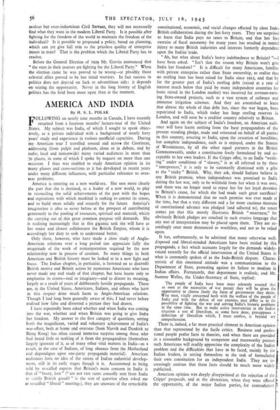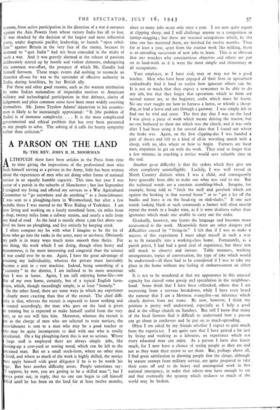AMERICA AND INDIA
By H. S. L. POLAK America is entering on a new world-:era. She sees more clearly the part that she is destined, as a leader of a new world, to play in reconciling the solid achievements of the past with the hopes and aspirations with which mankind is seeking to correct its errors, and to build more solidly and securely for the future. America's imagination is afire as never before at the prospect of contributing generously to the pooling of resources, spiritual and material, which the carrying out of-this great common purpose still demands. She is realising increasingly that in this gigantic task she will have as her major and closest collaborator the British Empire, whom it is accordingly her duty to seek to understand better.
Only those, however, who have made a close study of Anglo- American relations over a long period can appreciate fully the magnitude of the work of reinterpretation required by the new relationship now in process of creation. So many things in both American and British history must be looked at in a new light and focus. The Indian chapter, in particular, is fastened on to discredit British motive and British action by numerous Americans who have never made any real study of that chapter, but have learnt only to emphasise its errors—real or imaginary—and to distort its meaning, largely as a result of years of deliberately hostile propaganda. There are, in the United States, Americans, Indians, and others who have in this respect done much harm to Anglo-American relations. Though I had long been generally aware of this, I had never before realised how false and distorted a picture they had drawn.
I have repeatedly been asked whether and when India was coming into the war, whether and when Britain was going to giye India her freedom. My answer to the first category of questions, setting forth the magnificent, varied and voluntary achievement of India's war-effort, both at home and overseas (from Narvik and Dunkirk to Hong Kong) has often caused immense surprise among those who had heard little or nothing of it from the propagandists (themselves largely ignorant of it, as of many other vital matters in India—as a result, in the case of Indians, of long absence from the Motherland and dependepce upon one-party propaganda material). American audiences have no idea of the extent of Indian industrial develop- merit, still in its early stages though it is. Accustomed to being told by so-called experts that Britain's main concern in India is that of " booty, loot " (" are not vast sums annually sent from India to satisfy British greed? " is the sort of question often asked me at so-called " liberal " meetings), they are unaware of the remarkable constitutional, economic, and social changes effected by close Indo- British collaboration during the last forty years. They are surprised
to learn that India pays no taxes to Britain, and that her free exercise of fiscal autonomy for many years has resulted in mortal injury to many British industries and interests formerly dependent upon the Indian-trade.
" Ah, but what about India's heavy indebtedness to Britain? "—I have been asked. " Isn't that the reason why Britain won't give India her freedom? " It is difficult for many Americans, familiar with private enterprise rather than State ownership, to realise that no sterling loan has been raised for India since 1912, and that by far the greater part of India's sterling debt (raised at a rate of interest much below that paid by many independent countries for loans raised in the London market) was incurred for revenue-earn- ing State-owned projects, such as a vast system of railways and immense irrigation schemes. And they are astonished to learn that almost the whole of that debt has, since the war began, been repatriated to India, which today has large sterling reserves in London, and will soon be a creditor country relatively to Britain.
And again on the subject of India's freedom, an American audi- ence will have learnt nothing from the busy propagandists of the present standing pledge, made and reiterated on behalf of all parties in this country, assuring to India, upon the cessation of hostilities, her complete independence, such as is enjoyed, under the Statute of Westminster, by all the other equal partners in the British Commonwealth, under a constitution freely formulated by and ac- ceptable to her own leaders. If the Cripps offer, to an India "writh- ing " under conditions of " slavery," is at all referred to by these " interpreters," it is only to be summarily dismissed with a gibe at the " tricky " British. Why, they ask, should Indians believe in any British promise, when independence was promised to India during the last war, only to be withheld from her when it was over, and there was no longer need to repay her for her loyal devotion to Britain's cause, for which she had made such great sacrifices? When it is demonstrated that no such promise was ever made at the time, but that a very different and a far more cautious measure of constitutional advance was pledged (and adhered to), the retort comes pat that this merely illustrates British " smartness," for obviously British pledges are couched in such evasive language that any sort of interpretation may be placed upon them. They are ac- cordingly once more denounced as worthless, and not to be relied upon.
It has, unfortunately, to be admitted that many otherwise well- disposed and liberal-minded Americans have been misled by this propaganda, a fact which accounts largely for the demands widely- voiced recently for the official intervention of the United States in what is commonly spoken of as the Indo-British dispute. Charac- teristic of this emotional attitude was a communication to the Department of State, protesting against its failure to mediate in Indian affairs. Fortunately, that department is realistic, and Mr. Sumner Welles, the Under-Secretary of State, ieplied:
The people of India have been most solemnly assured that as soon as the necessities of war permit they will be given the opportunity to choose freely the form of government they desire. Wise men, vitally concerned both with the welfare of the people of India and with the defeat of our enemies, may differ as to the possibility of fighting the war and solving India's historic problems at the same time. But to make active intervention in the Indian situation a test of liberalism, as some have done, presupposes a definition of liberalism which, I must confess, is beyond my comprehension.
There is, indeed, a far more practical element in American opinion than that represented by the facile critics. Business and profes- sional people prefer facts to theories, and when these are provided in a reasonable background by competent and trustworthy persons such Americans will readily appreciate the complexity of the Indian problem and the difficulties that have to be faced, mainly by the Indian leaders, in setting themselves to the task of formulating their own constitution for an independent India. They are in- creasingly anxious that these facts should be much more widely publicised.
American opinion was deeply disappointed at the rejection of the Cripps' proposals, and at the abstention, when they were offered the opportunity, of the major Indian parties, for contradictory :
reasons, from active participation in the direction of a war a outrance against the Axis Powers from whose victory India has all to lose. It was shocked by the decision of the largest and most influential party, under dogmatic patifist. leadership, to launch " open rebel- lion " against Britain in the very face of the enemy, because its demand to "quit India" had not been conceded in the midst of such a war. And it was gravely alarmed at the release of passions deliberately stirred up by hostile and violent elements, endangering the common war-effort, the prospect of which Mr. Gandhi had himself foreseen. These tragic events did nothing to reconcile an America all-out for war to the surrender of effective authority in India, during hostilities, by her British ally.
For these and other good reasons, such as the wanton attribution by some Indian nationalists of imperialist motives to American military and technological participation in that defence, clarity of judgement and plain common sense have been more widely asserting themselves. Mr. James Truslow Adams' injunction to his country- men is likely to be increasingly appreciated: " It (the problem of India) is of immense complexity. . . . It is the most complicated governmental and ethical problem that has ever been presented to any people to solve. The solving of it calls for hearty sympathy rather than criticism."



























 Previous page
Previous page